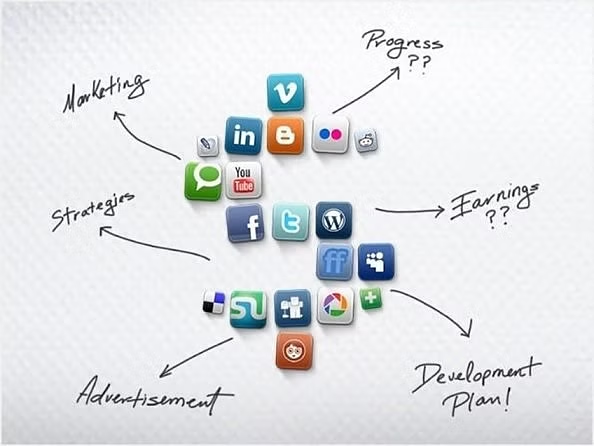Social media has become a major part of our daily lives. While it allows us to stay connected, share experiences, and stay informed, it can also contribute to feelings of anxiety, especially among adults. The pressure to maintain a perfect image, constantly compare ourselves to others, and stay up to date with everything can take a toll on mental health. In this article, we’ll explore how social media impacts adult anxiety and share practical tips to help manage it.
1. The Pressure to Be Perfect
One of the biggest challenges adults face on social media is the pressure to look perfect. From the carefully curated Instagram feeds to success stories shared on LinkedIn, it’s easy to fall into the trap of believing that everyone else has their life together. This creates unrealistic expectations, leading to feelings of inadequacy and self-doubt.
The constant comparison can make people feel like they aren’t good enough, which can increase anxiety. It’s important to remember that what we see on social media is often just the highlights of someone’s life. No one’s life is perfect, and comparing yourself to others online can create unnecessary stress.
2. Fear of Missing Out (FOMO)
Fear of missing out, or FOMO, is another common anxiety trigger that stems from social media. Seeing friends and acquaintances post about events, trips, or achievements can make you feel like you’re missing out on something important. Even if you’re content with your own life, social media can make you question whether you’re doing enough or living life to the fullest.
FOMO can lead to constant checking of social media, trying to stay in the loop, and feeling anxious when you aren’t up to date with everything. Over time, this constant need to stay connected can increase stress levels and make it harder to relax.
3. Information Overload
Social media platforms are designed to keep you engaged by providing endless streams of content. While this can be entertaining, it can also lead to information overload. With so much information coming at you, it’s easy to feel overwhelmed and anxious, especially when much of it is negative.
From news about global events to personal struggles shared by friends, social media can expose you to an overwhelming amount of content that may not always be good for your mental health. It’s important to take breaks from social media and limit how much time you spend consuming information to avoid burnout.
4. Cyberbullying and Negative Interactions
Although social media connects us with others, it can also open the door to negative interactions. Cyberbullying, trolling, and hurtful comments can create anxiety and fear. Many adults experience anxiety related to negative comments on their posts or being attacked for their opinions.
The anonymity of the internet can encourage people to say things they wouldn’t say in person, leading to toxic environments. If you find yourself feeling anxious due to negative interactions online, it might be time to block or unfollow certain accounts and prioritize your well-being.
5. The Dopamine Trap
Social media is built to keep you hooked. Every like, comment, or share provides a dopamine hit, giving you a sense of satisfaction. However, this can create a cycle where you constantly seek validation from others. Over time, the need for external approval can lead to anxiety when posts don’t receive the attention you hoped for.
The dopamine trap of social media can also lead to addictive behaviors, where you check your phone multiple times a day, seeking that small boost of happiness. This can leave you feeling anxious when you’re not online or when interactions on your posts don’t meet your expectations.
6. Tips for Managing Social Media Anxiety
Now that we’ve explored some of the ways social media can impact anxiety, let’s look at practical steps to manage it:
- Set Boundaries: Limit the amount of time you spend on social media each day. Setting specific times to check your accounts can help prevent mindless scrolling and reduce anxiety.
- Curate Your Feed: Follow accounts that bring you joy, inspiration, or positivity. If certain people or pages make you feel anxious, it’s okay to unfollow or mute them.
- Take Breaks: Regularly unplug from social media to give your mind a break. Use that time to focus on hobbies, exercise, or spend time with loved ones. Taking a break can help reset your mental health and give you a fresh perspective.
- Focus on Real-Life Connections: While social media can help you stay in touch, it’s important to prioritize face-to-face interactions. Spend time with friends and family offline to strengthen your real-life relationships.
- Practice Self-Care: Taking care of your mental health is crucial. Make time for activities that help you relax and de-stress, like meditation, journaling, or spending time in nature. Prioritizing self-care can reduce the impact of social media on your anxiety.
If you find that social media is significantly affecting your mental health, consider seeking help from a mental health professional. At Monarch Counseling, we offer counseling services to help individuals manage anxiety and stress. Talking to a professional can help you develop coping strategies and find balance in your life.
Social media can be a powerful tool for staying connected, but it also has the potential to contribute to anxiety, especially among adults. The pressure to be perfect, fear of missing out, information overload, and negative interactions can all impact mental health. By setting boundaries, taking breaks, and focusing on self-care, you can reduce the negative effects of social media on your anxiety.
If you find yourself struggling, don’t hesitate to seek help. Managing social media anxiety is about finding balance and being mindful of how it affects your well-being. Remember, it’s okay to take a step back when you need to and focus on what truly matters—your mental health. For more guidance and support, visit Monarch Counseling to explore ways to improve your mental wellness.

